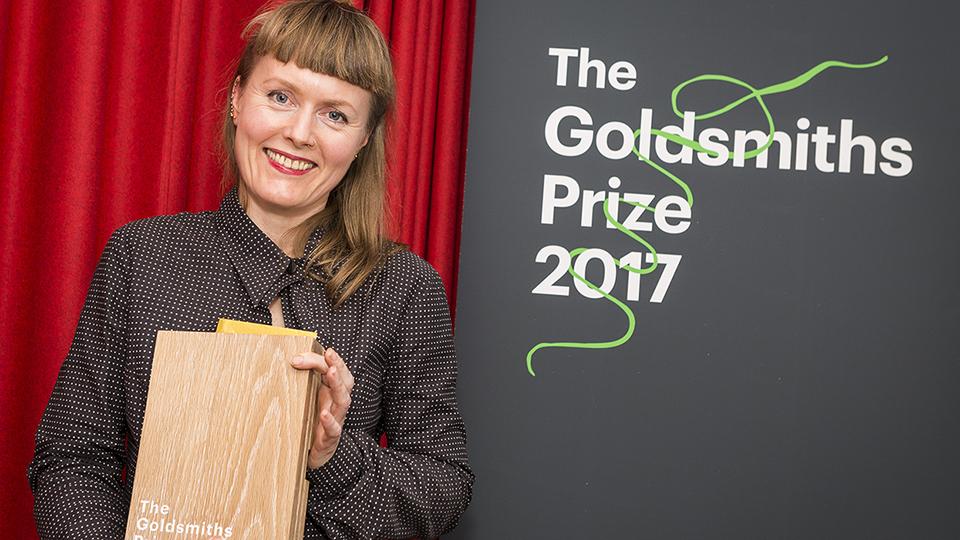Nicola Barker wins Goldsmiths Prize 2017
Primary page content
A novel presented like an illuminated manuscript for the digital age has won the Goldsmiths Prize 2017.

Nicola Barker. Photo: Kevin Moran Photography
Nicola Barker was announced as the winner of the £10,000 prize rewarding fiction at its most novel at a ceremony at Foyles in central London on 15 November 2017. She won the Goldsmiths Prize with H(a)ppy, her eleventh novel, after seeing previous works twice longlisted and once shortlisted for the Man Booker Prize.
In H(a)ppy Barker, one of Britain’s most joyously idiosyncratic novelists, breaks up lines with coloured words, injects spaces and diagrams, and finally carves symbols into the type as if the fabric of the text itself is breaking down.
The experimental presentation mirrors a tale of a future perfect world in which poverty, hatred, and suffering appear to have been eliminated. As this perfection unravels language and its infinite possibilities take centre stage as fragments mysteriously appear, repeat, and riff off each other in poetic, often musical, prose.
The judging panel was made up of Chair of Judges Naomi Wood, writers Kevin Barry and AL Kennedy, and writer, singer and songwriter Tracey Thorn.
Naomi Wood, Lecturer in Creative Writing at Goldsmiths, University of London said: “Nicola Barker’s H(a)ppy is a structural marvel to hold in the mind and in the hands. Line by line, colour by colour, this dystopic utopia is an ingenious closed loop of mass surveillance, technology, and personality-modifying psychopharmaceuticals. H(a)ppy is a fabulous demonstration of what the Goldsmiths Prize champions: innovation of form that only ever enriches the story. In Barker’s 3D-sculpture of a novel, H(a)ppy makes the case for the novel as a physical form and an object of art.”
Only works by authors from the UK and Republic of Ireland are eligible for the Goldsmiths Prize, launched in association with the New Statesman in 2013. It is committed to rewarding British and Irish fiction that breaks the mould or extends the possibilities of the novel form. Barker is the first English novelist to win the Prize.
Culture Editor of the New Statesman Tom Gatti said: “Nicola Barker is a writer who has broken the mould so many times that it’s almost beyond repair – and her novel H(a)ppy is an embodiment of the defiant and inventive spirit that the Goldsmiths Prize seeks to celebrate. Now more than ever we need fiction that offers a sense of resistance.”
Nicola Barker was born in Ely in 1966 and spent part of her childhood in South Africa. She is the author of ten previous novels – including Wide Open, Darkmans, The Yips and In the Approaches – and two short story collections. She lives and works in east London.
Eimear McBride was the first winner of the £10,000 prize for her work A Girl Is A Half-formed Thing. Subsequent winners were Ali Smith in 2014 for How to Be Both, Kevin Barry in 2015 for Beatlebone, and Mike McCormack in 2016 for Solar Bones.